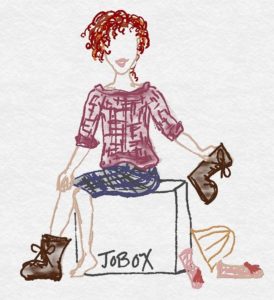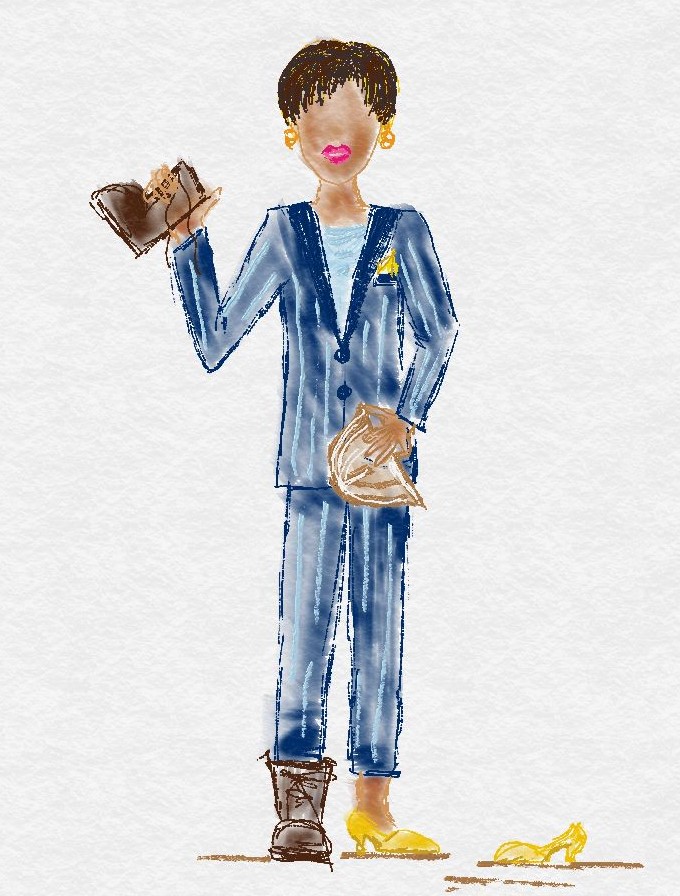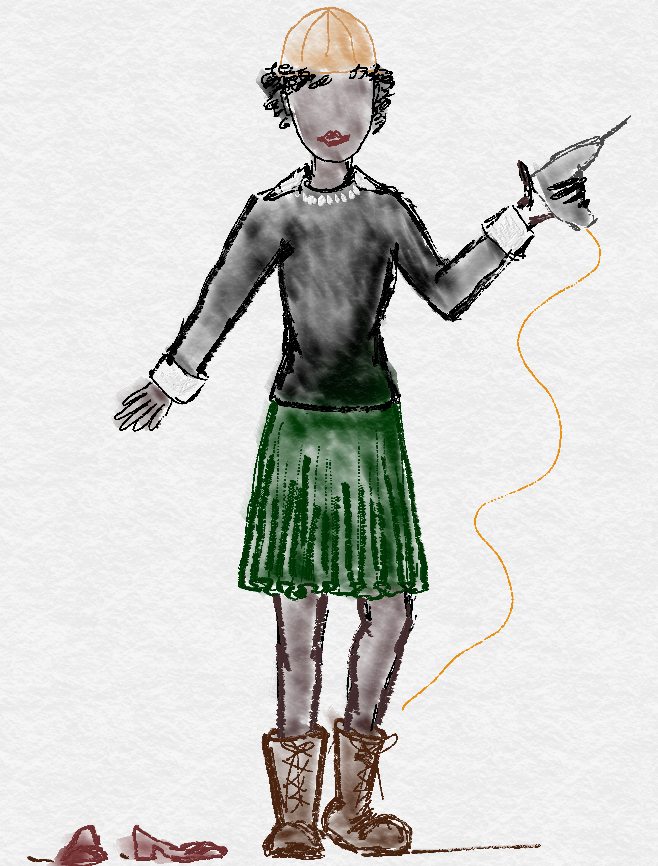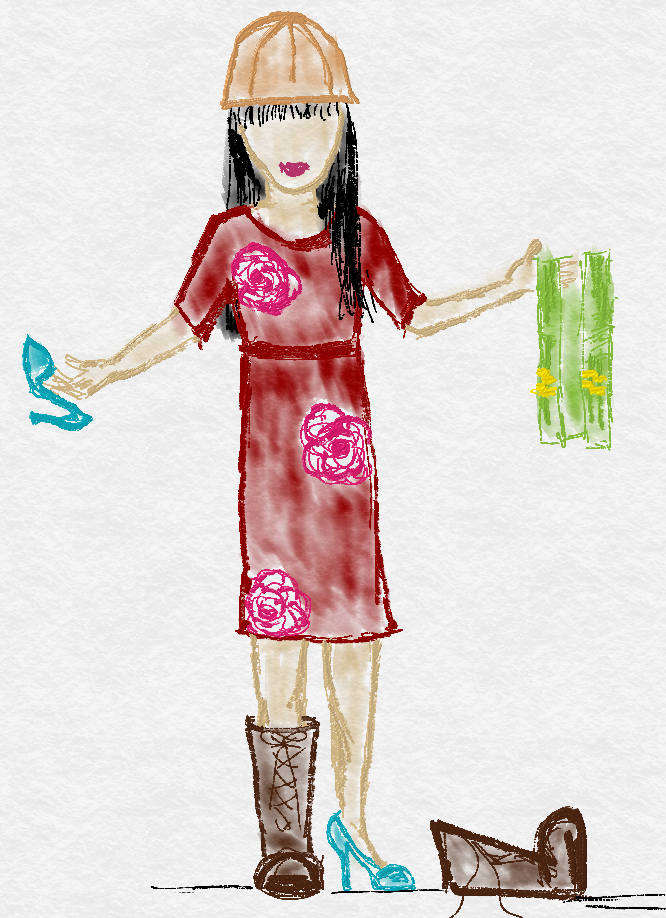Equality
Are You a Feminist?
What Does That Even Mean?
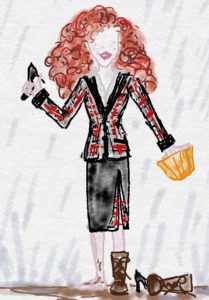
Are you a feminist? What exactly does that mean? And is it important to you to identify yourself as such?
Megyn Kelly, former Fox News host and current NBC news personality, was widely derided in 2016 by her refusal to label herself as a feminist. She stated that the term had become divisive and had negative connotations. Many women took that position as a cop out and an avoidance of the true issue: that being branded a feminist would alienate many of the average Fox viewers. They said that she needed to stand up for women as a whole, even if it meant losing her job at Fox.
So what does the average bear think a feminist is? The simple answer (obviously) would be that a feminist is a person who believes that women are equal to men and should be accorded the same respect and opportunities. But, unfortunately, many years of history have colored individual perceptions. In addition, the actions and words of some in the heat of the battle on inequality have generated a decidedly negative vision of what a feminist represents and who she (or he) is.
Gloria Steinem no doubt was the trailblazer in the modern world of feminism, though not the original pioneer by a long shot. Elizabeth Cady Stanton and Susan B. Anthony were the Lewis and Clark of the equality wilderness, raising issues and bucking the norm long before Ms. magazine challenged the accepted role of women in U.S. society. Julia Ward Howe, Ida B. Wells, Sojourner Truth – these women functioned and rebelled in conditions we can’t even imagine. They made people face truths and answer questions that weren’t comfortable or conventional. Thanks to them, you’re sitting at your desk working on a tieback design or standing on a construction site yelling at people about clean bottoms.
Unfortunately, many of the men (and some of the women) of the times reacted to these women by assuming that since they didn’t want to fill a normal societal role, they didn’t want to be a “normal woman.” Translation: They didn’t like men and they didn’t want to be feminine. Although part of this was ignorance and part of it was an attempt at control through shaming, the ugly side effect was a lingering implication that feminists didn’t like being womanly and they were against men.
Organized feminist actions in the 1970s compounded this stereotype. The bra-burning, tie-wearing, loud, angry women that demonstrated for equal pay and equal opportunities reinforced the notion that feminists are rude, unfeminine, “coarse” ball-busters who don’t like men and have no interest in being nice to them. In fact, they want reparations for 12,000 years of oppression.
It’s often so easy to forget that people who start revolutions have to overcome years, decades, centuries of inertia. Society has been functioning as X, and now someone wants it to be Y. This doesn’t happen easily. It takes anger, it takes aggression, it takes breaking out of stereotypes just to get people’s attention. Changing the average person’s mind is another mountain to climb once you have their attention. It’s no wonder the early feminists seemed angry. They were trying to get people to listen! They were TIRED!!! They were exhausted from trying to overcome centuries of societal inertia. They were worn out from attempting to use logic to overcome fear and emotion. They were frustrated from worrying that they would be unsuccessful.
Despite the reason, the negative stereotype of a feminist still exists with many people. The purpose of all the hard work of Ms. Cady Stanton and Ms. Steinem and the others was to allow us all to be equal, regardless of who we are. They didn’t mean to support just women – they intended to establish equality for everyone. Purple, three-headed Martians would be accorded the same freedoms and rights as WASP males and women of east-central northern Irish descent who were born on the subway. But the residue of the battles remains, and the feminist brand often is not a positive one.
Some modern women, particularly those of a certain age, believe that to resist the feminist label is to abandon the cause. You are a failure if you don’t embrace the title and forge on with the battle. But are you? Do we shirk our duties as progressive women if we don’t deem ourselves warriors?
On a personal level, I have a serious problem with being given any label (except that of a University of Louisville Cardinal). Whether the label is true depends on how you define it. You might define it differently than I do. Beyond the definition, I might decide that I want to change in the future. The issue might change. DO NOT TELL ME WHO I AM.
I also don’t like the idea that being a feminist means tipping the scales against men. Equality means equality, not “We should get lots extra to make up for all that crap in the past.”
Here at Underpinnings, we have noticed an interesting development in this label issue. Younger women in our field are not as comfortable making a fuss about equality or their rights in the workplace, and they often aren’t ready to proclaim themselves feminists. In some cases, it’s because they don’t see their world as that bad. It’s not, because we’ve made progress. In other cases, they see us more seasoned professionals as being too confrontational and ready to raise hell. (See my previous comments on being exhausted from fighting the battle for so long). To them, the idea of being a feminist smacks of unnecessary and insensitive crusading.
In the case of Ms. Kelly, I believe that the whole point of feminism is to get us to the place where women can do what they want with their careers. When she was at Fox, she wanted to be at Fox. Was she wrong to monitor her language so as not to alienate the very audience she wanted to court? Yes, you say – she has an obligation to do what’s right for the advancement of all of us. Does she? Maybe the success of feminism is that she can express her opinion, whatever it is, and she gets to be the person to figure out what strategic moves she needs to make to have the career she wants. Whether that career is worthwhile is her business.
A necessary component of succeeding in war is unity. When the war is over, troops often have a difficult time establishing themselves as individuals, particularly if the issues from the war aren’t completely resolved. There is even fear of functioning outside of your unit, outside of the war. The need for determination and grit are so compelling during the battle that to give it up seems suicidal. Those women who fought the hardest of the wars of the past no doubt fear we will lose all the ground we’ve gained if we give up for even a second. They say that women are traitors who won’t go by the name “feminist,” lest we all end up back in the kitchen, illiterate with no freedom.
Perhaps we need a new word, one that represents our goal of equality for all, which was the original purpose. Allofusist? Everyoneist? Peopleist? We need to refocus on the fact that we celebrate women, not that we denigrate men. And we need to acknowledge that one of the spoils of this war was supposed to be our right to call ourselves whatever we want and carry out our personal and professional lives however we want. Ms. Kelly doesn’t have to call herself a feminist as far as I’m concerned. It won’t affect my ability to be what I want, which of course is a Cardinalist.
Revolutions Don’t Happen When Everyone Is Happy
Are You Uncomfortable?
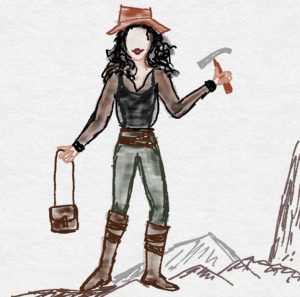
(Warning: This post contains a slang word that may be offensive to some. It should be offensive to all).
Last week I was sitting in an uncomfortable chair, being assaulted by a stranger’s cell phone conversation overflow, and mourning yet another precious few hours of my life that were forever lost while waiting for a flight at the Dallas-Fort Worth airport. I have spent enough time being distracted and bored in that place that I am convinced the ghost of my youthful enthusiasm roams the concourses when I’m not there.
Two airport workers, both men, took seats next to me on an apparent break. They chatted and laughed, calling out to other workers they knew as they walked past. One employee in particular strolled over to spend a good 10 minutes describing how badly the work was going where he was assigned. He moaned and groaned about delays and %^$#ups, repeatedly saying that he was sure the trouble could be traced back to the woman who was in charge of scheduling for the project. Finally finished complaining, he went to walk away and the first two guys tried to give him some words of encouragement. He shook them off and said, “Oh, it’s only going to get worse. You ever worked with a beaver before?”
I was shocked – only that he had the nerve to make such a statement in front of so many airline customers. Surely he would fear someone lodging a complaint?
On the other hand, his statement itself didn’t surprise me at all. It was not the first time, nor the fortieth time, I have heard some variation on a remark like this. And although “sensitivity training” has become commonplace in many workplaces, I can’t say that the frequency I hear such comments on construction sites and in engineering offices has decreased. The offenders now just preface their remarks with, “Well, I’ll get in trouble with the sensitivity training people if I say this, but….”
This is reality. Most women in our field can say they have experienced some degree of this type of behavior, if not worse. Many women in our field also can give lengthy recitations of less blatant, but similarly intended, slights, insults, and otherwise ugly occurrences. Thankfully, the landscape appears to be somewhat friendly for many women now, particularly younger women. No doubt corporate culture has evolved to an awareness of gender issues that has reduced the amount of discrimination, be it overt or subtle, that some women experience on a daily basis. But serious issues still persist, or we would not have this blog, and you would not be reading it. In order to eliminate those problems, we must be willing to be uncomfortable.
Several months ago, I was having dinner with a colleague, a seasoned professional. Someone else mentioned Underpinnings, and he said he was all for promoting women in our field. He then went on to say he had attended a dinner intended to introduce women to other professionals in their workplace. He said it was fine until two of the women started talking about dresses. Dresses! He was appalled. How could these women expect to be taken seriously if they acted like, well, women?
Normally, my Southern-bred manners would have required me to just gloss over this comment and change the subject. (Do not make dinner unpleasant under any circumstances). But I felt there was an important point to make with an influential person. So I asked him, “What’s wrong with talking about dresses? Do we have to pretend we’re not who we are in order to be accepted as engineers?” The question took him aback. He didn’t really have an answer. I could only hope that he would continue to ponder the issue after he left, coming to a more enlightened position on the matter.
The point is that ignorance and hostility will persist if we are not willing to make ourselves uncomfortable to effect change. This example was a mild one, but perhaps more in keeping with common occurrences many professional women experience. The more hostile conditions and situations require more aggressive action. If we as individuals are not willing to create a stir, or make someone else unhappy, or be labeled as a troublemaker, the offensive activities will continue. Cheerleading and commiseration only go so far. Acknowledging those who support us is great, but ignoring those who don’t won’t make them go away.
Certainly, the conditions for women in our field are better now than they were 25 years ago, and outstanding compared to what existed 50 years ago. But the man in the airport is proof that we’re not in Candyland yet. And if you think that his blatant misogyny and your issues with getting promoted in your office aren’t connected, you are putting your head in the sand.
Those of us in the Over 40 crowd can say that we have had to fight a lot of ugly battles to get where we are today. And those of you in the Under 40 crowd have a better set of circumstances as a result. I can say honestly that I once was locked in a job trailer with a large aggressive jobsite superintendent who had decided it was time I put out. I was told in a progress meeting in front of 30 men that I wasn’t going to decide what concrete was good or bad, “…just because you swish your ass in front of everyone.” And a former boss decided that sleeping with him was part of my project duties. Each of these situations caused me to have to take a stand and risk being labeled as a trouble maker. But each instance was wrong, and I hope my discomfort caused change that allowed some other women to go about their business without similar problems.
During a number of other times in my career, I chose to act as though there were no problems. I thought if I acknowledged the issues, it would give the opposition, or even my boss or my clients, a reason that a woman should not be in my position. I believed that if I concentrated on getting along with those who appeared to support me that I could eventually win everyone over to my side. But human nature is not so malleable, and men who are aggressively opposed to women having responsibility are not going to be persuaded by good manners and a plate of cookies. Sometimes you have to call out the injustice. Sometimes you have to declare war on the hate. It’s not pleasant, but real changes in cultural myopathy rarely are accompanied by teddy bears and candy canes. A committee meeting is not going to stop that knuckle-dragging evolutionary hiccup from referring to his female co-worker as a beaver. Revolutions don’t start when everyone is happy.
I truly appreciate all of the men who support us, and I’m grateful for the strides that have been made to create a professional environment that is more welcoming to women today. I also hope that those same women who are benefitting from struggles in the past are willing to go to bat for themselves and others who are in situations in the present that are still far from perfect. If you won’t speak up and say you don’t like ham sandwiches, don’t complain to your friends that lunch is never any good.
I Am Not One of the Boys
Sometimes Being Tough Means Being Stupid

There are a number of milestones most women will experience if they undertake a career in a field populated mainly by men. At some point, you will get singled out in a very conspicuous situation (important meeting, large construction site) for being the only female within miles and will be asked to give relationship advice. Somewhere down the line, you will be the object of someone’s unwanted affection, creating an uncomfortable professional situation with potentially negative career implications. More than once, you will have “female problems” at a very inopportune time. (Group cringe here). And in response to some random occurrence, you will feel the need to act as if you are never treated differently, and you will assert that you are too tough to let any little sexism bother you. You might as well be one of the guys, right?
I wish I could say a) I’ve never done this and b) I’m too young to see the problem with this response. Alas, I can claim neither. Much like most of you, some experience(s) in my past caused me to act as if all was well and the screaming bad behavior of those around me wasn’t a problem. Many mistakes later, I wish I had been honest and dealt with the situations as they were, rather than how I wished they were. My “toughness” did no one any good and undermined my professional progress as a whole.
To be clear, I am a highly empathetic and sympathetic person, but I have no stomach for high maintenance behavior and whining. I think trophies should go to those who earn them, and most people don’t understand the value of hard work. Everyday life is not a Hallmark card; that’s why they make those cards to commemorate the moments that are. And even those who love their jobs don’t wake up every morning singing with a chorus of forest animals and dreaming of the two-hour conference call to come. If life isn’t challenging you don’t learn anything, and if you think only about yourself, you live your life with the maturity of a seventh grader.
On the other hand, to ignore obstructive conditions in the workplace is not being tough and growing, it’s being counterproductive and inefficient. Many of us have felt at some point like it was time to “suck it up” and just proceed as if the sexist old draftsman isn’t doing all of your projects last because he doesn’t think you should be there or the contractor isn’t spending so much time looking down your shirt that he’s not listening to you telling him THE SHAFT BOTTOMS AREN’T CLEAN ENOUGH. We have told ourselves the conditions at hand were just there as a rite of passage, and it will all get better once the people involved see that we’re competent. Often, someone else will be telling us that we would make life easier for ourselves if we didn’t mention any problems we have and just act like one of the guys. But we’re not. And to evaluate things dishonestly is illogical and very un-engineerlike. Nothing – not the project, not your company, and certainly not your life – will benefit from evaluating conditions as they might be, instead of how they are. And your dishonesty about who you are will have long range consequences.
Shortly after I opened my company, an architect I knew got me hired to do special inspections at a state prison project. I was thrilled for the work, and I ignored the architect’s history of flirting beyond the line of appropriateness. The benefit to my new business outweighed any perceived discomfort on the job.
I had worked on a number of prison projects, and I was familiar with typical protocols for ongoing work at an existing facility. However, the architect said this project was a bit different and that he wanted to visit the site with me for the first inspection to make sure all was well. The site was three hours away, and he insisted on riding together so he could brief me on the way. He was formal and appropriate on the drive down, so I assumed all would be well.
When we arrived at the site, I found out the project was being constructed with prison labor. I was escorted to the area in question by six guards with rifles, plus the warden. Although I was surrounded by 25 prisoners with tools, I had plenty of protection, so my initial misgivings evaporated and I was grateful for a hopefully profitable project.
We had no sooner left the prison grounds when the architect surprised me with his plans for a tryst at a local motel, followed by a “nice lunch” at a nearby greasy spoon. (How could I say no when chicken fried steak was being offered?) I was furious, and I told him we were going home NOW. He grumbled and whined for three hours.
I hope you have enough faith in me to know that I drove to the next inspection by myself. When I arrived at the prison, the puzzled guard at the gate told me the warden was gone for the day and they had no one scheduled to escort me. He said they could spare a guard to walk me back to the site, but that I would have to just stick with the guard/superintendent who was in charge of the jobsite after that. Seriously?
This is the point when I should have said no. This is a prison. These men are incarcerated, and they have tools. No person with any sense would send a 30-year old female into a construction site with 25 felons and only one guard. But I couldn’t stand the idea that someone would say the inspection didn’t get done just because I was a female. So I said, “Sure. Okay, let’s go.” The guard who was the site superintendent was furious and cussed the escort guard a blue streak. I finished my inspections (mostly), but I finally left the site when a small, heavily scarred man started walking around me in circles, muttering and slamming a hammer into his palm.
I found out later that after I turned him down, the architect told the prison board that I didn’t need so much protection because I was a “tough girl.” He also purposefully didn’t tell the warden I would be on-site that day. The warden went ballistic when he found out I was at the site with so little protection, and one guard lost his job.
Did I get the job done? Yes. But the risk to me, (and the risk of a riot and injuries the warden told me), was not commensurate with the product. Being able to measure mortar proportions on that job did not prove that I was a good engineer and did prove that my judgment might be questionable. In fact, I had let my emotions (pride and stubbornness) override my stewardship of the best interest of the project.
There are many degrees of femininity, and some women will blend into an environment that is mostly male with more ease than others. But that ease should not be equated with being a better engineer/contractor/equipment salesperson/sword swallower. I am NOT one of the boys and I never will be. But I’m a damn good engineer.
Bought and Paid For
How Do We Ignore the Voices That Say We’re Not Enough?
A couple of weeks before Christmas, I was watching TV and a trailer for the movie “Hidden Figures” came on. A man in the movie asked Janelle Monae if she would want to try to become an engineer if she were a man, and she said, “No, because I would already be one.” And I cried.
The next week, I was in Barnes and Noble buying a book for my niece, and I happened upon the book, “Isabella, Girl in Charge,” which uses plays on words to introduce influential women in political history. I got to the last page, where the daddy has Isabella on his shoulders as a woman is being inaugurated President of the United States, and I cried.
As I was fleeing the curious stares in the bookstore, I was mentally yelling at myself, “What is the matter with you?” Don’t get me wrong – I am a board certified crier. If you yell at me on a jobsite or try to start a fight in a meeting, I won’t shed a tear. But if two people fall in love during a 15-second coffee commercial, or my football team wins, or there’s a ribbon cutting at the car wash down the street, I’m a torrential downpour worthy of a Weather Channel official name. I’m an empathetic weeper, more likely to cry with joy than with sadness, so tears are not unusual for me on an average Monday.
It took me several days of evaluation akin to a good wall failure analysis to figure out what was going on. I know that I cry at movies, but my reaction to the trailer was a bit much, even for me. And I was disappointed in the election results, (even though I don’t agree with all of Secretary Clinton’s policies), but there was something else there, something that reached beyond my distaste for President-Elect Trump’s attitude toward women.
I have to admit, I was shocked and well, to be honest, embarrassed when I finally realized that my emotional reaction really was a latent condition that was triggered by the election. It made me realize that I bought it. Bought what? The idea that women are ever so subtly just not as good as men in certain areas. Somewhere, deep in the recesses of my psyche, some little piece of me actually has believed the pervasive social perception that women are less in some parts of life. To be the star engineer, to be president – if it happened it was a fluke because we aren’t really equipped to do that. I’m not really equipped to do that.
How could this be? I’m still amazed. My feelings certainly had nothing to do with the way I was raised. My parents NEVER differentiated between their two boys and two girls. They asked us, “What do you want to do? What do you want to be?” They drove me to Little League baseball practice, not because they were on a feminist crusade, but because my brothers played and I said I wanted to, too. I told them I wanted to be good enough to play professionally when I grew up, and they said, “Great! Work hard.” (Thank goodness I quickly discovered that I hate baseball and that football is life). I could have said I wanted to grow up to be the foreman on an offshore oil rig and they would have sat down with me and come up with a plan involving a good education and a lot of hard work.
I have been fortunate enough to be surrounded by supportive and equality-minded friends and family my whole life. And I can’t think of anyone who has met me for more than 3.6 seconds who would classify me as a pushover or a doormat. So how did this happen?
Stepping outside my head a bit, it occurred to me that apparently the fabulous friends and family didn’t create enough of a wall to keep the chatter from the rest of the world out. I went through school only one year after my wonderful, brilliant older brother. No matter what I did, no matter what great test scores I got, someone always was around to mention, “Yeah, but her brother did way better.” In high school, my school didn’t have calculus*, so three of us lobbied to drive over to the nearby boys’ school during lunch to get to take calculus there. We didn’t get the arrangements made until the first week of the school year, so we couldn’t take the top class, which was a college credit class. But we enrolled in the advanced calculus class, and we got the top three test scores for the first four tests of the year. Several of the teachers commented, “They got the best scores, but it’s because they’re not in the top class.” And in college, I heard repeatedly that girls do well in engineering school only because they study more. It didn’t help that I didn’t particularly like math, and English was my favorite subject. This only reinforced the stereotype that I wasn’t really meant to be there.
Even in my professional career, where I own my own business and I’ve worked through some brutal conditions on remote jobsites, I have listened to snide little remarks about how I got things done because I got along with the guys, not because I was technically competent or because I had good management skills. And there has been no shortage of well-meaning people who didn’t realize how condescending it is to act like it’s “cute” that a little woman is ordering guys around on a construction site.
I suppose the constant outside influences somehow penetrated my rock-headed Irish consciousness over the years. And for that I am embarrassed, and disappointed, and angry. I think the possibility of a woman becoming President somehow was a subconscious trigger for me, a sign that maybe all of those people were wrong. We say all the time that anyone can be anything in the United States, but I think that a woman becoming President would make a nice concept a reality. And somehow it would validate the theory that women are just as capable as men of doing anything – math, science, world domination. And it would validate that who I’ve been all these years is not a façade over an inadequate structure.
Of course I’m crying as I type this, and I hope that little girls everywhere share no inkling of the insecurity I apparently have felt for many years. I hope that we have a woman in the White House in the near future, not because we need to prove anything, but because we can. In the meantime, I’m going to concentrate on exorcising this demon of doubt from my soul. I’m not happy that the election turned out the way it did, but I’m glad that the trauma of it wrenched free a problem I didn’t even know I had. Who knows? Maybe that woman President will be me.
*Note: Mercy Academy in Louisville, Kentucky, has more than made up for lost time, becoming the first all-girls high school in the U.S. to have a STEM-accredited program. Mercy also launched an award winning ad campaign several years ago that centered around the theme “You’re Not a Princess.” Go Jaguars!
